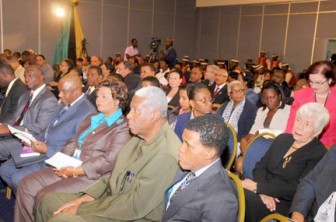Leader of the Opposition in the National Assembly, Brigadier (ret’d) David Granger is calling on his colleagues to consider constitutional changes to permit the election of full-time members of the National Assembly sometime in the future.
Granger was at the time presenting a paper entitled “Part-time Parliament, Full-time Parliamentarians: Are Sittings Adequate?” to the 37th Conference of the Commonwealth Parliamentary Association of the Caribbean, Americas and Atlantic Region, held in Kingston, Jamaica, a press release from the Office of the Leader of the Opposition said.
The conference was held under the theme: ‘Low Citizen Confidence in Governance: How Can Parliamentarians Build Trust in Caribbean Legislatures?’

Granger, in his presentation, referred to similar calls by former Speaker of the National Assembly, Ralph Ramkarran and former PNCR Chief Whip, Lance Carberry.
Both felt that the efficient functioning of the parliamentary committee system and the need for greater scrutiny could justify consideration of full-time Members of Parliament in Guyana.
The release said further that Granger also cited the recommendations of Commonwealth Parliamentary Adviser Sir Michael Davies whose Report, entitled “Needs Assessment of the Guyana National Assembly”, presented a sober, structured and serious indictment on the manner in which the Assembly was managed during the 9th Parliament under the PPP/C administration.
The ‘Davies Report’, the release said, exposed the methods devised by the Executive branch which had the effect of thwarting democracy and undermining the independence of the Legislative branch. It concluded, in brief, that the National Assembly’s weaknesses were the result of the Executive branch’s attempts to run the legislature like a government department rather than to allow it to function as an independent institution.
The Commonwealth Parliamentary Association of the Caribbean, Americas and Atlantic Region is made up of 18 branches from 17 countries and consists of parliamentarians who are united by their “respect for the rule of law, democracy and individual rights and freedoms, without regard to gender, race, religion or culture.”





